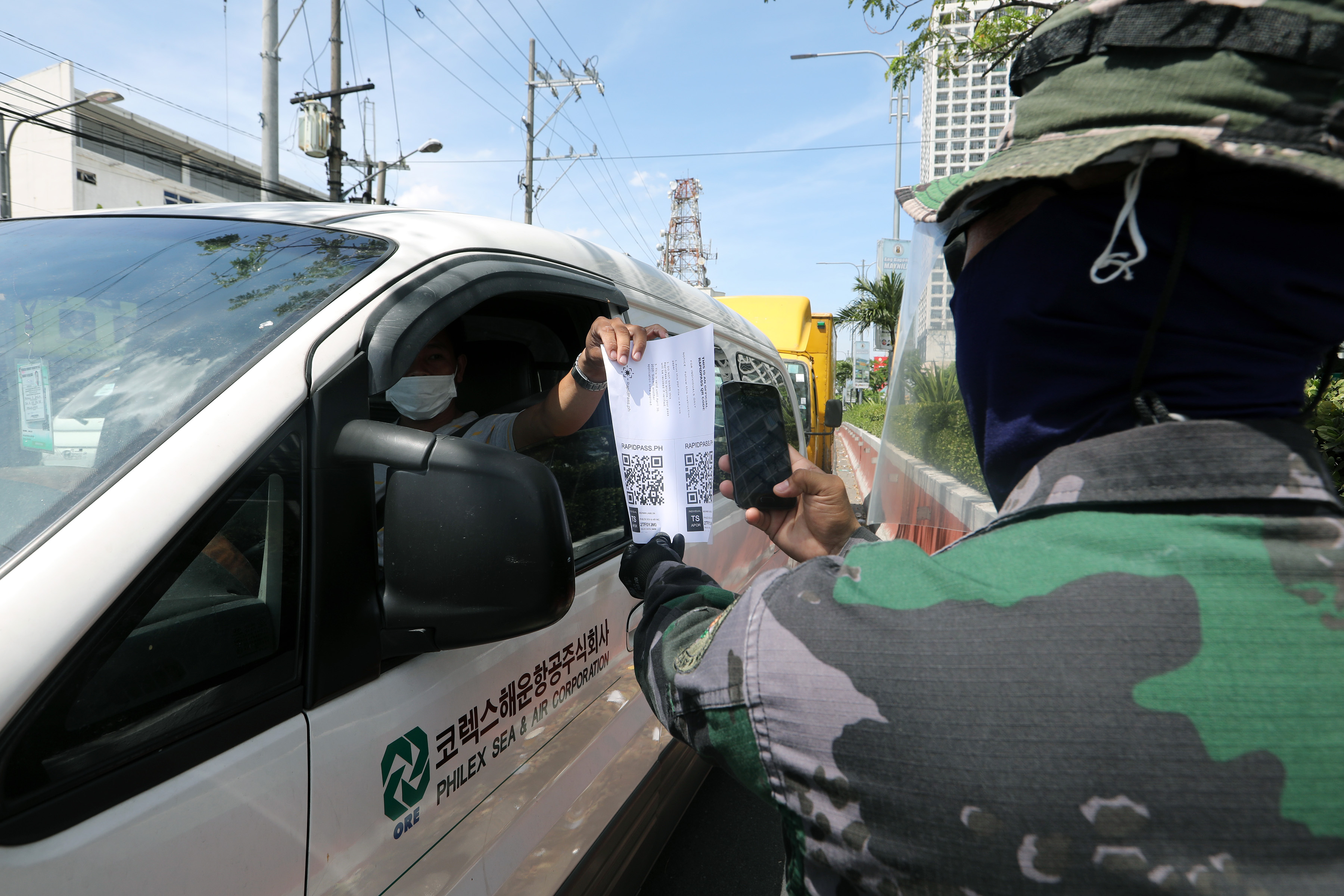News
Non-essential travel in ECQ, GCQ zones still banned: IATF-EID

FILE: Quezon City Police District (QCPD) personnel scan the Rapid pass presented by the driver at the Enhanced Community Quarantine (ECQ) checkpoint along España Boulevard at the Manila-Quezon City boundary on Wednesday (April 29, 2020).
MANILA – Malacañang on Thursday enumerated the individuals who are allowed to travel in areas that are under enhanced community quarantine (ECQ) and general community quarantine (GCQ) from May 1 to 15.
In a televised virtual press conference, Presidential Spokesperson Harry Roque said the non-essential entry and exit of people to and from the areas under ECQ and GCQ will be prohibited to curb the spread of coronavirus disease 2019 (Covid-19).
This was contained in the omnibus guidelines on interzonal movement approved by the Inter-Agency Task Force for the Management of Emerging Infectious Diseases (IATF-EID) on Wednesday, Roque said.
“Ano po ang general rule? Lahat ng non-essential, bawal (What is the general rule? All non-essential travel is prohibited),” he said.
The new set of guidelines provides for the transit of people and goods from an area under ECQ to an area under GCQ, and vice versa.
Roque said people who are exempted from the new rule are health workers; government officials and government frontline personnel; those traveling for medical or humanitarian reasons; those transiting to the airport for travel abroad; and workers providing essential goods and services and public utilities.
Also exempted are essential skeletal workforce; repatriated overseas Filipino workers (OFWs) and other returning Filipinos; and other persons transported through the efforts of the national government upon conduct of necessary quarantine protocols and in concurrence with the receiving local government units (LGUs), he added.
Roque said the movement of all types of cargoes by land, air, or sea within and across areas placed under ECQ or GCQ should be unhampered.
“Workers in the logistics sector, such as cargo, trucking, and port operations shall likewise be allowed to transit across areas placed under ECG or GCQ,” he said.
Roque said all LGUs are directed to strictly abide by the national policy, provided that only a minimum of five personnel may operate cargo and delivery vehicles by land, with or without load.
He added that LGUs and local health units are likewise enjoined not to issue orders that are contrary to or inconsistent with the new directives.
“Strict social distancing measures must be strictly observed, which may include, if necessary, the putting of additional safe and humane seats or spaces in the vehicles,” Roque said.
Roque said the Philippine National Police would also retain its authority to conduct inspection procedures in checkpoints for the purpose of ensuring that protocols on strict home quarantine are observed.
Roque said land, air or sea travel by uniformed personnel, government officials and government employees for official business with the corresponding travel authorities, especially those transporting medical supplies and laboratory specimens related to Covid-19 and other relief and humanitarian assistance would also be allowed.
He added that OFWs, permanent residents of foreign jurisdiction, and stranded foreign nationals may leave for abroad through any of the airports or seaports in areas placed under ECQ or GCQ sans any impediment.
“This provision shall not be interpreted to allow outbound travel by Filipinos to countries where travel restrictions are in place,” Roque said. “Departing passengers may be accompanied by not more than one person when traveling to an international port, who shall be allowed to return to his or her point of origin.”
Roque said repatriated OFWs or returning non-OFWs who have been issued a certificate of completion of 14-day facility-based quarantine or may be required to undergo a mandatory 14-day home quarantine should also be granted unhampered transit across zones en route to their final destination in the country.
“For this purpose, LGUs are enjoined to allow maritime vessels or aircraft transporting the abovementioned OFWs and non-OFWs to dock or land at their ports of destination,” he said.
Metro Manila; Central Luzon, except Aurora; Calabarzon; Pangasinan; Benguet; Iloilo province; Iloilo City; Bacolod City; Cebu province; Cebu City; and Davao City are placed under ECQ until May 15.
Other areas that are not under ECQ will be placed under GCQ.





















